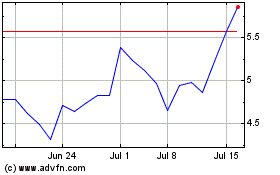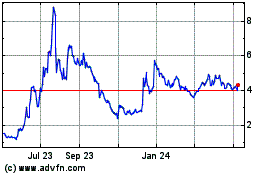Marker Therapeutics, Inc. (Nasdaq: MRKR), a clinical-stage
immuno-oncology company focusing on developing next-generation T
cell-based immunotherapies for the treatment of hematological
malignancies and solid tumor indications, today announced
non-clinical data of its lead multi-tumor-associated antigen
(multiTAA)-specific T cell product candidate, MT-401, in an
Off-the-Shelf (OTS) setting and provided an update on clinical
readiness for the OTS program.
Non-Clinical Proof-of-Concept Data of
MT-401 OTSIn a set of in vitro experiments, the Research
and Development team at Marker demonstrated anti-tumor activity of
MT-401 OTS in a partially human leukocyte antigen (HLA) matched
setting to kill THP-1 cells, an aggressive treatment-resistant
Acute Myeloid Leukemia (AML) cell line.
The results of this non-clinical study have been
posted on the Investor Relations section of the Marker website and
are briefly summarized below:
- THP-1 cells were genetically
modified to be bioluminescent, allowing long-term, undisturbed
tracking of AML cell growth.
- THP-1 cell growth was followed for
5 days in the presence or absence of MT-401 OTS (manufactured from
healthy donors matching 2/8 HLA alleles to THP-1 cells).
- Leukemic cell growth was
significantly reduced when treated with MT-401 OTS.
- Meanwhile, untreated THP-1 cells
continued to grow in the absence of treatment.
- Microscopic analysis confirmed the
MT-401 OTS-induced killing of AML cells.
- MT-401 OTS demonstrated a
significant anti-tumor effect in vitro with just 2/8 matched HLA
alleles, suggesting that this low level of matching criteria may be
useful for future OTS clinical studies.
- The low level of allele matching
would open the door to an OTS AML killing cell bank that could be
suitable for many patients.
“We recently developed this long-term in vitro
model to monitor the interaction of cancer cells with
multiTAA-specific T cells and to further investigate the tumor
killing capacity of the MT-401 OTS product,” said Eric A. Smith,
Ph.D., Director of Research and Development of Marker Therapeutics.
“In collaboration with Alexandre Carisey, Ph.D., Assistant
Professor Baylor College of Medicine, we used live cell confocal
microscopy to visualize the potential of MT-401 OTS to eliminate
tumor cells and confirm our previous observations. These
non-clinical data highlight that MT-401 OTS has the potential to
kill tumor cells in a partially HLA-matched setting and underscore
the potential of MT-401 OTS as a treatment option in patients with
relapsed/refractory (r/r) AML. In the post allogeneic hematopoietic
stem cell transplant (HSCT) setting, MT-401 OTS could expedite the
availability of treatment by eliminating the need to find the
original transplant donor.”
Clinical Readiness of MT-401
OTSThe use of antigen-specific cells in a partially
HLA-matched setting has been validated and extensively tested in
the clinic by others (Leen et al., Blood, 2013; Tzannou et al.,
Blood Adv, 2019; Tzannou et al., J Clin Oncol, 2017). The
favorable safety profile of these OTS products is achieved by
enriching antigen-specific T cells and reducing alloreactive cells,
thereby reducing the risk of graft-versus-host disease (GVHD).
The U.S. Food and Drug Administration (FDA) has
cleared the clinical protocol to investigate MT-401 OTS as a
treatment in patients with r/r AML. Marker has established a
cellular inventory of 8 lines manufactured from healthy donors,
with ongoing efforts to further expand the inventory. At full scale
production, a single donor could provide treatment for
approximately 40 patients, and the current stability program
indicates that OTS multiTAA-specific T cell products are stable for
more than a year in liquid nitrogen, permitting future on-demand
availability for broad-scale implementation. Marker anticipates
that the first patient will be treated with MT-401 OTS during the
first half of 2024.
“One of the biggest limitations to cell therapy
is manufacturing of individualized products,” said Juan F. Vera,
M.D., President and Chief Executive Officer of Marker Therapeutics.
“Our OTS multiTAA-specific T cell strategy would remove this
limitation by manufacturing a cell bank inventory from healthy
donors that were carefully selected to cover a large patient
population. This strategy has been tested extensively in the clinic
at Baylor College of Medicine in the context of virus-specific T
cells (VST). Applying this strategy to tumor-specific T cells will
enable Marker to manufacture at a large scale and characterize the
multiTAA-specific T cell products ahead of time. This will not only
expedite administration and significantly reduce manufacturing
cost, but also drastically reduce the time between patient
identification and treatment, to as little as 72 hours. This quick
turnaround time would be beneficial for treating patients with
rapid cancer progression, such as those with measurable residual
disease in the AML setting, which typically advances rapidly into
Frank Relapse with dismal outcomes.”
“Our OTS strategy is intended to address the
commercial bottlenecks such as costs and time to treatment, imposed
by the manufacture of individualized T cell products and the
donor-to-donor variability of starting material. If MT-401 OTS is
successful in clinical trials, we will consider expanding the OTS
multiTAA-specific T cell program to other indications with unmet
medical needs,” concluded Dr. Vera.
About Acute Myeloid Leukemia
(AML)AML is a life-threatening and debilitating disease
that is rapidly progressive and fatal if untreated. Despite
achievement of initial responses with induction regimens, relapse
rates remain high particularly those with higher risk disease.
Allogeneic hematopoietic stem cell transplant (HSCT) remains the
only curative treatment for many patients. However, recurrence
post-HSCT is common and outcomes are dismal with an estimated
median survival of less than one year (Estey and Döhner, Lancet,
2006), underlining the urgency for more effective and accessible
treatment options.
About multiTAA-specific T
cellsThe multi-tumor associated antigen
(multiTAA)-specific T cell platform is a novel, non-genetically
modified cell therapy approach that selectively expands
tumor-specific T cells from a patient's/donor’s blood capable of
recognizing a broad range of tumor antigens. Clinical trials that
enrolled more than 180 patients with various hematological
malignancies and solid tumors showed that autologous and allogeneic
multiTAA-specific T cell products were well tolerated and
demonstrated durable clinical responses, and consistent epitope
spreading. The latter is typically not observed with other T cell
therapies and enables the potential contribution to a lasting
anti-tumor effect. Unlike other cell therapies which require
hospitalization and close monitoring, multiTAA-specific T cells are
designed to be administered in an outpatient setting.
About MT-401 OTSThe
investigational allogeneic MT-401 Off-the-Shelf (OTS) product
utilizes a non-genetically modified approach that specifically
targets four different antigens upregulated in AML cells (WT-1,
Survivin, PRAME, NY-ESO-1). OTS products match a patient’s human
leukocyte antigen (HLA) genotype with the appropriately HLA
identified and cryopreserved MT-401 OTS product in the cell bank
inventory.
About Marker Therapeutics,
Inc.Marker Therapeutics, Inc. is a clinical-stage
immuno-oncology company specializing in the development of
next-generation T cell-based immunotherapies for the treatment of
hematological malignancies and solid tumor indications. The cell
therapy technology Marker has in place is based on the selective
expansion of non-engineered, tumor-specific T cells that recognize
tumor associated antigens (i.e., tumor targets) and kill tumor
cells expressing those targets. This population of T cells is
designed to attack multiple tumor targets following infusion into
patients and to activate the patient’s immune system to produce
broad spectrum anti-tumor activity. Because Marker does not
genetically engineer the T cells, Marker believes that its product
candidates will be easier and less expensive to manufacture, with
reduced toxicities, compared to current engineered CAR-T and
TCR-based approaches, and may provide patients with meaningful
clinical benefit. As a result, Marker believes its portfolio of T
cell therapies has a compelling product profile, as compared to
current gene-modified CAR-T and TCR-based therapies.
To receive future press releases via email,
please visit: https://www.markertherapeutics.com/email-alerts.
Forward-Looking StatementsThis
release contains forward-looking statements for purposes of the
safe harbor provisions of the Private Securities Litigation Reform
Act of 1995. Statements in this news release concerning the
Company’s expectations, plans, business outlook or future
performance, and any other statements concerning assumptions made
or expectations as to any future events, conditions, performance or
other matters, are “forward-looking statements.” Forward-looking
statements include statements regarding our intentions, beliefs,
projections, outlook, analyses or current expectations concerning,
among other things: our research, development and regulatory
activities and expectations relating to our non-engineered
multi-tumor antigen specific T cell therapies; the effectiveness of
these programs or the possible range of application and potential
curative effects and safety in the treatment of diseases; the
timing, conduct and success of our clinical trials of our product
candidates, including MT-401 OTS for the treatment of patients with
AML; and our manufacturing strategies. Forward-looking statements
are by their nature subject to risks, uncertainties and other
factors which could cause actual results to differ materially from
those stated in such statements. Such risks, uncertainties and
factors include, but are not limited to the risks set forth in the
Company’s most recent Form 10-K, 10-Q and
other SEC filings which are available through EDGAR
at WWW.SEC.GOV. The Company assumes no obligation to update
its forward-looking statements whether as a result of new
information, future events or otherwise, after the date of this
press release except as may be required by law.
ContactsTIBEREND STRATEGIC
ADVISORS, INC.InvestorsDaniel Kontoh-Boateng(862)
213-1398dboateng@tiberend.com
MediaCasey McDonald(646)
577-8520cmcdonald@tiberend.com
Marker Therapeutics (NASDAQ:MRKR)
Historical Stock Chart
From Mar 2024 to Apr 2024

Marker Therapeutics (NASDAQ:MRKR)
Historical Stock Chart
From Apr 2023 to Apr 2024
